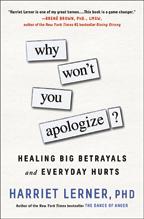
We have all experienced it. Someone in your life, be it a friend, a spouse, a partner, or a coworker, apologizes to you and instead of feeling better you feel worse. When someone tells you they are sorry and follows it up with a “but” statement as to why they were hurtful, you are not actually receiving an apology.
They think they apologized, but what they really did with their “but…,” was put the blame back on you. Harriet Lerner, Ph.D., delves into apologies, blame and personal responsibility with humor and insight in her new book, “Why Won’t You Apologize? Healing Big Betrayals and Everyday Hurts.”
Lerner is one of America’s most respected relationship experts. She is the author of 12 books, including the New York Times bestseller “The Dance of Anger.” Lerner has been a practicing psychologist for more than 40 years and served as a staff psychologist at The Menninger Clinic for over two decades. She currently has a private psychotherapy practice in Lawrence, Kansas, and lectures nationwide.
Lerner decided to become a psychologist at a very young age.
“In truth, I made the decision to become a psychologist before I entered kindergarten, and I never veered from this goal,” Lerner said. “My precocious career choice probably had to do with my mother putting my big sister and me in therapy before the age of 3. Unlike other mothers of the day who thought therapy was a last resort for the mentally ill, my progressive Jewish mother thought it was a learning experience. My family was poor, but my mother had a special insurance policy in Brooklyn that allowed her to get therapy for a dollar a session. Under the same policy, my pediatrician was none other than Dr. Benjamin Spock — who also cost one dollar.”
Lerner states that her Jewish upbringing had a huge impact on her decision to become an author.
“My writing books has everything to do with my Jewish upbringing, where achievement was next to godliness,” she said. “My parents, both children of poor Russian immigrants, were high school graduates and wanted their daughters to have all the educational opportunities that they were not able to have. Being Jewish in my family meant being a moral person, changing the world and maybe being a Nobel Prize Laureate along the way. I think the subject of this book reflects my Jewish upbringing because family connectedness and making amends was a highly prized Jewish value.”
Lerner and her husband, Steve Lerner, Ph.D., met in graduate school for clinical psychology at City University of New York. They eventually moved to Kansas to work at The Menninger Clinic, where they stayed for over 20 years.
“When Menninger closed shop in Topeka and moved to Houston, we moved to Lawrence. I’ve learned to love the big open skies of Kansas. I am also grateful for the simple life, and the fact that I’ve never had to learn to parallel park,” Lerner stated.
The Lerners have a private practice in downtown Lawrence. They also have two grown sons.
“We were most involved in the Jewish community while raising our boys in Topeka,” Lerner said. “My husband taught Hebrew at Temple Beth Sholom in Topeka where our boys, Matt and Ben, were Bar Mitzvahed. I grew up in Flatbush (Brooklyn) where I thought everyone was Jewish. So raising our kids in Topeka was an education for me because often they were the only Jewish child in their class, and back then the teachers would invite Steve and I to come to the school to talk about ‘the Jewish way of celebrating Christmas.’ ”
Lerner has written numerous books that address relationships stuck in blame and emotional distance, so a book about apologizing was a natural and compelling subject for her.
“When the words, ‘I’m sorry’ are part of a heartfelt apology, they are the most powerful two words in the English language,” Lerner said. “The courage to offer a heartfelt apology, and the wisdom to apologize wisely and well, is at the heart of our relational world. All of us have been hurt by a person who won’t take responsibility, listen to our feelings or feel genuine empathy and remorse. Taking responsibility for our part of a problem is difficult because we are all hard-wired for defensiveness. Defensiveness is automatic and universal. It’s also the arch enemy of the apology and the arch enemy of intimacy and connection. We automatically want to blame the other person and protect our image of ourselves.”
Lerner addresses topics such as, “Who is responsible for what?” “What are the five ways to ruin an apology?” “How can we best get through to the person who hurt us?” and “How do you heal a big betrayal like infidelity?” with her trademark wit, intelligence and insight. Lerner states that her favorite chapter, and the one that was most difficult to write is, “You Need to Forgive and Other Lies that Hurt You.”
“I turn the usual notions about forgiveness on their head,” said Lerner. “I also consulted with my two favorite rabbis while writing this chapter. I am especially eager to hear from Jewish readers about their reaction to my somewhat unorthodox views on the subject.” (One of those two rabbis is Rabbi Debbie Stiel of Temple Beth Sholom in Topeka. The other is Rabbi Fred N. Reiner, rabbi emeritus of Temple Sinai in Washington, D.C.)
Lerner uses many real-life examples and both her style and subject matter are extremely relatable.
“I can’t imagine ever retiring,” she said. “I love my work. And without my work as a therapist, there would be no books.”



